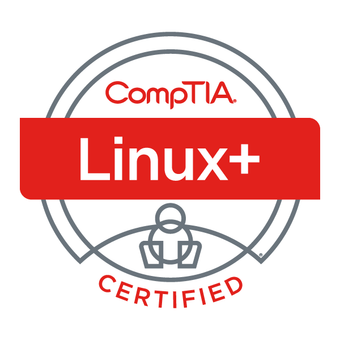XK0-005

| Formats: | Asynchronous |
| Blended | |
| Online | |
| Onsite | |
| Part-time | |
| Level: | Beginner |
| Prerequisites: | |
| Recommended Knowledge | |
| Basic Understanding of Computer Hardware and Software | |
| Fundamental Knowledge of Linux: | |
| Experience with Command Line Interface | |
| Networking Fundamentals | |
Formats: We offer our training content in a flexible format to suit your needs. Contact Us if you wish to know if we can accommodate your unique requirements.
Level: We are happy to customize course content to suit your skill level and learning goals. Contact us for a customized learning path.
CompTIA Linux+ (XK0-005)
CompTIA Linux+ is a great course for foundational knowledge and to start a career in cybersecurity because it provides learners with a solid understanding of Linux operating system concepts and how to manage Linux systems effectively. Linux is widely used in the field of cybersecurity, and understanding how to work with Linux systems is an important skill for anyone looking to start a career in this field. The Linux+ course covers a wide range of topics, including system architecture, Linux installation and package management, file and directory management, user and group management, and network configuration, among others. These topics are essential for anyone looking to work with Linux systems, and provide a strong foundation for further study in the field of cybersecurity.
Additionally, the Linux+ certification is highly regarded in the IT industry and is recognized by employers worldwide. Earning the certification demonstrates that an individual has a comprehensive understanding of Linux system administration, and is capable of working with Linux systems in a professional capacity. Furthermore, the Linux+ certification can open up numerous job opportunities in the field of cybersecurity, as many organizations require skilled professionals who can manage Linux systems and ensure their security. In conclusion, the CompTIA Linux+ course is an excellent choice for anyone looking to gain foundational knowledge in Linux system administration and start a career in cybersecurity. It covers a wide range of essential topics and provides learners with a strong understanding of Linux systems and their management, while the certification can help individuals stand out to potential employers and open up numerous job opportunities in the field.
Course Overview
- Introduction to Linux
- Understanding Linux Distributions
- Installing Linux
- Using the Command Line Interface
- Configuring Basic System Settings
- Working with Files and Directories
- Managing Users and Groups
- Installing and Updating Software
- Managing Processes and Services
- Configuring Network Settings
- Securing Your System
- Troubleshooting Common Issues
Module 1: Introduction to Linux
- Understanding the history of Linux
- Understanding the philosophy of Linux
- Understanding the differences between Linux and other operating systems
Module 2: Understanding Linux Distributions
- Understanding the different types of Linux distributions
- Understanding how Linux distributions are created and maintained
- Choosing the right Linux distribution for your needs
Module 3: Installing Linux
- Understanding the Linux installation process
- Choosing the right installation method
- Installing Linux on a virtual machine or physical machine
Module 4: Using the Command Line Interface
- Understanding basic Linux commands
- Navigating the Linux file system
- Managing files and directories using the command line
Module 5: Configuring Basic System Settings
- Understanding Linux system configuration files
- Configuring the system clock
- Managing system hardware
- Managing system software
- Managing system services
Module 6: Working with Files and Directories
- Understanding file permissions and ownership
- Changing file permissions and ownership
- Creating and deleting files and directories
- Copying, moving, and renaming files and directories
- Searching for files and directories
Module 7: Managing Users and Groups
- Understanding Linux user and group concepts
- Creating and managing users and groups
- Setting user and group permissions
Module 8: Installing and Updating Software
- Understanding Linux software package management
- Installing software packages using package managers
- Updating software packages using package managers
- Removing software packages using package managers
- Managing software repositories
Module 9: Managing Processes and Services
- Understanding Linux process and service management
- Viewing and managing running processes
- Starting, stopping, and restarting services
- Enabling and disabling services at boot time
- Configuring system runlevels
Module 10: Configuring Network Settings
- Understanding Linux networking concepts
- Configuring network interfaces
- Configuring DNS settings
- Configuring routing and firewall rules
- Managing network services
Module 11: Securing Your System
- Understanding Linux security concepts
- Securing user accounts and passwords
- Configuring firewalls and intrusion detection systems
- Encrypting filesystems and data
- Applying security updates and patches
Module 12: Troubleshooting Common Issues
- Identifying and resolving common Linux issues
- Troubleshooting network connectivity issues
- Troubleshooting software and hardware issues
- Using system logs to diagnose issues
- Recovering a Linux system from a boot failure